 Petzlover
Petzlover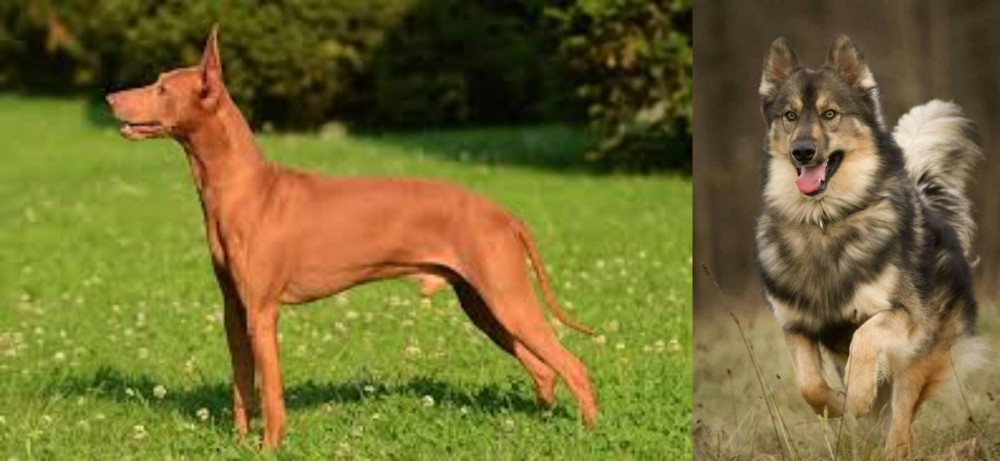 Cirneco dell'Etna is originated from Italy but Native American Indian Dog is originated from United States. Cirneco dell'Etna may grow 18 cm / 8 inches higher than Native American Indian Dog. Cirneco dell'Etna may weigh 108 kg / 238 pounds lesser than Native American Indian Dog. Cirneco dell'Etna may live 7 years less than Native American Indian Dog. Both Cirneco dell'Etna and Native American Indian Dog has same litter size. Cirneco dell'Etna requires Moderate Maintenance. But Native American Indian Dog requires High Maintenance
Cirneco dell'Etna is originated from Italy but Native American Indian Dog is originated from United States. Cirneco dell'Etna may grow 18 cm / 8 inches higher than Native American Indian Dog. Cirneco dell'Etna may weigh 108 kg / 238 pounds lesser than Native American Indian Dog. Cirneco dell'Etna may live 7 years less than Native American Indian Dog. Both Cirneco dell'Etna and Native American Indian Dog has same litter size. Cirneco dell'Etna requires Moderate Maintenance. But Native American Indian Dog requires High Maintenance
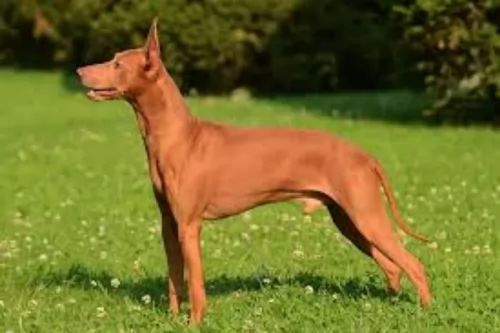 The Cirneco dell’Etna comes from the island of Sicily and not mainland Italy, although it is considered an Italian dog. It is a small dog that hunted rabbits and its calling card was its ability to go for hours without water or food. They have terrific endurance and a good sense of smell. They were developed for the harsh terrain they worked around places like Mount Etna. Of all the Mediterranean island hunting dogs, the Cirneco de’Etna is the smallest.
The Cirneco dell’Etna comes from the island of Sicily and not mainland Italy, although it is considered an Italian dog. It is a small dog that hunted rabbits and its calling card was its ability to go for hours without water or food. They have terrific endurance and a good sense of smell. They were developed for the harsh terrain they worked around places like Mount Etna. Of all the Mediterranean island hunting dogs, the Cirneco de’Etna is the smallest.
This is a very ancient breed, surviving on its hunting skills alone for thousands of years on Sicily. They then became guard dogs for the peasants. Because they had such speed, sense of smell, alertness and sight, they were great hunters.
Today’s Cirneco de’Etna is highly competitive in confirmation and make terrific pets. They are exceedingly friendly, energetic and low maintenance. Lure coursing is what they really excel at. They are good at agility and pursuit games as well.
 The Native American Indian Dog is an ancient breed, that some consider to be feral. It is a landrace breed that developed with the indigenous peoples North America. These dogs originally looked and sounded like wolves and it is likely that their ancestry is tied to wolves crossed with pre-Columbian American dogs that came to the America’s with the first peoples. There are some that believe the Native American Indian Dog is a connecting line back to the dogs or wolves that over 12,000 years ago were the first to be domesticated by human beings.
The Native American Indian Dog is an ancient breed, that some consider to be feral. It is a landrace breed that developed with the indigenous peoples North America. These dogs originally looked and sounded like wolves and it is likely that their ancestry is tied to wolves crossed with pre-Columbian American dogs that came to the America’s with the first peoples. There are some that believe the Native American Indian Dog is a connecting line back to the dogs or wolves that over 12,000 years ago were the first to be domesticated by human beings.
They are now a rare breed in the wild and a small group of domesticated dogs. Fossil studies in recent years suggests that the Native American Indian Dogs came to North America about 4500 years after the first indigenous peoples. It is believed that the Native Americans bred the dogs that traders and explorers brought with them to the native coyote as well. This created a breed specific to North America and called the Common Native Dog or the Common Indian Dog. The original NAID was a mix of many different breeds of dogs and wild canines.
Today’s NAID is said to be raised on Indian reservations in the United State and represent a mix of Chinook, Husky, German Shepherd Dog and Malamute, along with perhaps some of today’s wolf mixed in. This dog is raised domestically and is socialized to life with humans. They are the last remaining breed from all the Native North American dogs that lived with the original people of the Americas. They are also thought to have an ancestry similar to the Australian Dingo.
They are a devoted, protective and loyal breed though they tend to be shy. They need to be outside for the majority of the day and don’t do well in crates. They need a fenced yard and room to roam. They are working dogs that hunted, pulled sleds and guarded their homes. They still need a job to so.
Today the North American Indian Dog is being bred to replicate the temperament and appearance of the originals. Although there are many breeders working from the founding breeder with original stock, there are only six that are officially given authorization to breed the NAID. They are registered by Terra Pines with the National Kennel Club but not recognized by the AKC and UKC.
The breed name NAID is trademarked by Karen Markel of Majestic View Kennels in the 1990’s. Today the breed is nationally recognized as a breed very much like the original Native American dogs, The breed is intelligent and quite healthy. They enjoy people and engage in many companion activities.
Whatever its true ancestry the current Native American Indian Dog (NAID), today’s version is not recognized by the AKC, but they are recognized by the Dog Registry of America, the Native American Indian Dog Registry and the National Kennel Club.
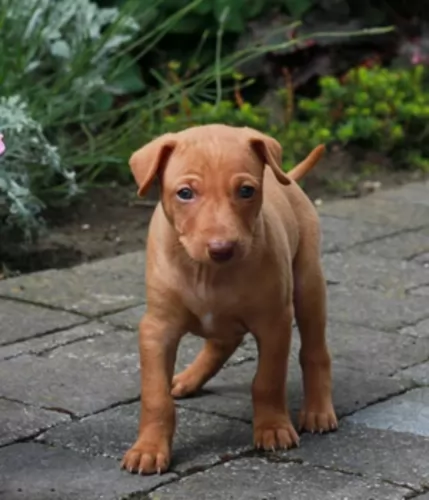 The Cirneco de’Etna is a sleek, muscular sighthound. His ears are close together and high on his head. The head is lean, and the skull is almost flat in profile. The muzzle is about the same length as the skull and the nose is large and its coloring matches the dog’s coat. They have hard pads the same color as their nails, but they are never black.
The Cirneco de’Etna is a sleek, muscular sighthound. His ears are close together and high on his head. The head is lean, and the skull is almost flat in profile. The muzzle is about the same length as the skull and the nose is large and its coloring matches the dog’s coat. They have hard pads the same color as their nails, but they are never black.
 There are two sizes of the North American Indian Dog – they are medium and large. They have dense short double coats, or they have long top coats and a fairly dense undercoat. They come in a variety of colors mostly black or silver but there is also a tortoiseshell. These tortoiseshell colored dogs are considered by Native Americans to be sacred beings. These tortoiseshell dogs are strikingly good looking and are called Spirit Dog.
There are two sizes of the North American Indian Dog – they are medium and large. They have dense short double coats, or they have long top coats and a fairly dense undercoat. They come in a variety of colors mostly black or silver but there is also a tortoiseshell. These tortoiseshell colored dogs are considered by Native Americans to be sacred beings. These tortoiseshell dogs are strikingly good looking and are called Spirit Dog.
They all have the look of a Siberian Husky or Alaskan Malamute with upright ears and almond shaped eyes that are anywhere from amber to brown with some blue. Usually their tails are down and long but can be curled. They resemble the wolf and have that wild, feral appearance. They can be as large as over one hundred pounds or average seventy to eighty pounds. They are strong, alert and intelligent. They are considered to be hypoallergenic, shedding their coat only once a year.
 This breed is gentle and loving with children.
This breed is gentle and loving with children.
Endurance, strength and good health.
Low adaptability to small living spaces and lack of outside space; don’t do well in crates and need an experienced dog owner.
They are highly intelligent, love to learn and are just a little stubborn.
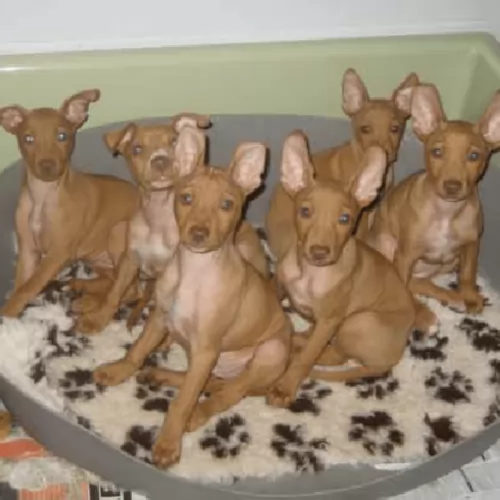 Like many dogs that come from ancient breeds with little cross breeding over the years, there are not a lot of inherited issues for the Cirneco de’Etna. Also, there are so few dogs remaining that little is known about their health in general and there are no studies to go on. Some breeders will do test despite the fact that none are recommended.
Like many dogs that come from ancient breeds with little cross breeding over the years, there are not a lot of inherited issues for the Cirneco de’Etna. Also, there are so few dogs remaining that little is known about their health in general and there are no studies to go on. Some breeders will do test despite the fact that none are recommended.
Their most common health issues are acquired such as injuries from running or competitions and obesity. Both can be controlled by the owner.
 This is a fairly healthy, long lived breed having spent so much of its history in isolation. They are prone to some of the issues that affect all medium to large breeds.
This is a fairly healthy, long lived breed having spent so much of its history in isolation. They are prone to some of the issues that affect all medium to large breeds.
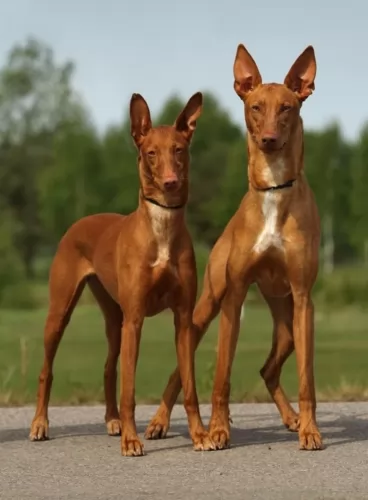 The Cirneco needs a good quality food since they are such high energy dogs. Be careful not to overfeed them so that they become obese.
The Cirneco needs a good quality food since they are such high energy dogs. Be careful not to overfeed them so that they become obese.
As previously mentioned, the main concern for owners is injuries acquired while on a running course or in the activities of daily living. They have been known to hurt their feet. They need their ears checked regularly for any signs of infection or irritation. Clean out any excess water or dirt.
This is an intelligent, hardy breed that needs mental and physical stimulation. They need a job, or they can be a major problem. They love hunting of course but also excel at agility, lure crossing, and competition. He is loyal and loves being with people. Take him for long walks but don’t let him off the leash.
 Because of their propensity to grow to quickly the puppy should only stay on puppy food for 8-10 months. Feed them a high quality large dog puppy food 3-4 times daily for a total of 2-21/2 cups per day.
Because of their propensity to grow to quickly the puppy should only stay on puppy food for 8-10 months. Feed them a high quality large dog puppy food 3-4 times daily for a total of 2-21/2 cups per day.
Feed a high protein, large dog dry food twice a day for a total of two cups. Do not over feed. Do not feed right before or after exercise do to the risk of bloat.
Healthy, strong long lived dog.
This is not an indoor, couch potato dog. They need exercise and they need space. They won’t do well as apartment dogs unless you can take them to a dog park for over an hour every day. They really need a large fenced in yard. They don’t do well in crates either. He doesn’t understand crates and thinks you are punishing him. They make great hunters, search and rescue dogs, service dogs and therapy dogs. They will succeed at pulling competitions and weight competitions.